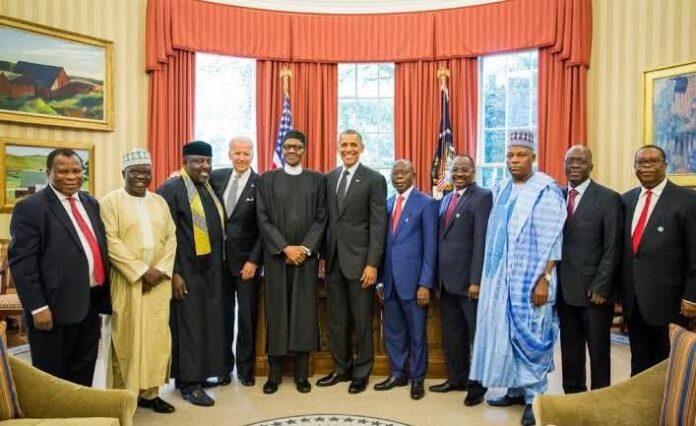By: Daure David
Nigeria’s political landscape has undergone significant transformations, especially with the election of Muhammadu Buhari in 2015, an event that some argue was subtly influenced by foreign actors. The role of external powers in Nigerian politics, particularly the United States, remains a subject of intense debate. Were U.S.-funded non-governmental organizations (NGOs) instrumental in the removal of Goodluck Jonathan? Did the Obama administration covertly back Buhari’s rise to power? And what does this suggest about the broader dynamics at play in Africa’s most populous nation?
The Role of Foreign Influence in Nigerian Politics
Before 2015, Nigeria was often lauded for its rapid economic growth, emerging as the third fastest-growing economy in the world. Yet, by the time Buhari took office, Nigeria’s economic landscape had drastically shifted. The government, under President Goodluck Jonathan, had faced mounting criticism, especially concerning security issues and corruption. With the Boko Haram insurgency wreaking havoc in the northeast, the government struggled to contain the threat, and the abduction of over 200 schoolgirls in Chibok in 2014 became a focal point of global outrage.
The Obama administration expressed increasing concern over the security situation in Nigeria, particularly following the Chibok kidnappings. Humanitarian and political pressure intensified, and it appeared that the United States was more vocal about Nigeria’s need for leadership change. Some critics argue that U.S. support for Buhari wasn’t just about a commitment to democracy but also tied to broader strategic interests in sub-Saharan Africa, including counterterrorism efforts and economic opportunities.
As Nigeria’s 2015 election loomed, Buhari’s opposition APC (All Progressives Congress) received significant international attention and support. There are claims that U.S.-funded NGOs played a critical role in mobilizing the electorate, advocating for change, and challenging the status quo. While the exact extent of USAID’s involvement remains a matter of conjecture, it is clear that foreign-backed initiatives promoting democratic values were actively at play. These programs often helped foster a climate where dissent against Jonathan’s government grew.
The Consequences of Buhari’s Presidency
Buhari’s election represented a historic moment for Nigeria—he was the first sitting president to be defeated in a democratic election. But the post-election period revealed a country facing increasingly dire economic conditions. Despite Buhari’s promise of anti-corruption reform and national security, Nigeria saw a dramatic downturn in its economic fortunes. Under his leadership, Nigeria shifted from being one of the world’s fastest-growing economies to facing severe economic challenges, with millions falling into poverty. In fact, by 2018, Nigeria overtook India as the poverty capital of the world.
Critics argue that while Buhari’s administration initially garnered Western support due to its stance on tackling corruption and security threats, the resulting economic mismanagement and growing insecurity left Nigeria worse off. The rise in poverty and unemployment under his government has led many to question the true motivations behind his ascent to power. Could the United States have unknowingly contributed to the worsening conditions by prioritizing the removal of Jonathan over a more sustainable, homegrown solution?
Nigeria, Libya, and Côte d’Ivoire: A Pattern of Intervention?
The situation in Nigeria mirrors that of other African nations where Western powers have intervened, sometimes with catastrophic results. In Libya, NATO’s intervention in 2011 led to the ousting of Muammar Gaddafi. While the initial action was framed as a humanitarian effort, the subsequent instability that followed the collapse of Gaddafi’s regime plunged the country into chaos. Similarly, Côte d’Ivoire experienced a period of political turmoil following the 2010 elections, which saw international powers, including France and the U.S., actively supporting the removal of Laurent Gbagbo. Both cases raise questions about the efficacy and motivations of Western-backed interventions.
In each of these instances, the post-intervention realities were fraught with instability, economic decline, and rising violence. These outcomes highlight a troubling pattern of foreign influence that, while often framed as support for democracy and human rights, may inadvertently contribute to political and economic crises in the regions it seeks to assist.
A Critical Look at Foreign Policy and Its Real Impact
While foreign powers like the U.S. may present their involvement in African nations as part of a larger strategic partnership for peace and democracy, the actual outcomes often paint a more complicated picture. The story of Nigeria under Buhari’s leadership is a case study in the unintended consequences of international intervention. While the U.S. and its allies may have been motivated by a desire to combat corruption and terrorism, the fallout has left Nigeria with deepened poverty, rising insecurity, and an economy in turmoil.
Unlike the certainty of Donald Trump’s foreign policy approach, where the lines between allies and adversaries are more clearly drawn, the Obama administration’s support for Buhari was ambiguous and left many Nigerians wondering if their nation’s long-term interests were adequately considered. Ultimately, it’s vital to question whether the pursuit of foreign interests, such as combating terrorism and promoting economic liberalization, has been worth the cost borne by ordinary Nigerians.
Nigeria, like many African nations, is at a crossroads. The country needs a government that can truly address its internal challenges—corruption, economic inequality, and insecurity—without the overbearing influence of external powers. While international partnerships are necessary for addressing issues like terrorism, it is imperative that Nigerian leaders take ownership of their nation’s future. The rise of Muhammadu Buhari was meant to signify a new era for Nigeria, but as the country continues to grapple with the consequences of his presidency, it is clear that the complexities of global influence cannot be overlooked.
As Nigerians look to the future, the lesson is clear: leadership must come from within, and the interests of the Nigerian people should always take precedence over external agendas.








